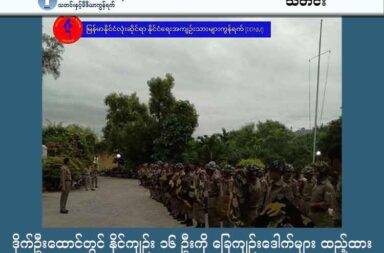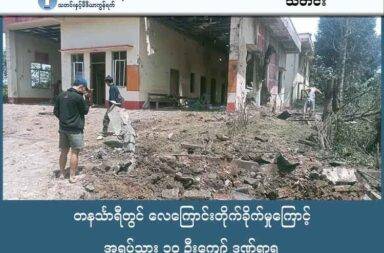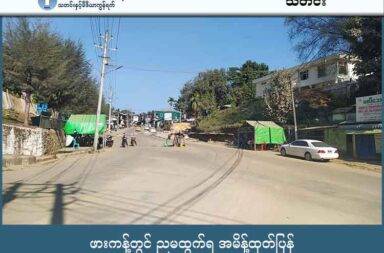Govt Reps, NCA-Signatory EAOs Agree to Continue Ceasefire Implementation
Leaders discussed how to make mechanisms like the JMC, UPDJC and JICM functional again.
By NETWORK MEDIA GROUP (NMG)
Monday, March 11, 2019
Participants in an informal meeting on Saturday between ethnic armed organizations (EAO) signatories to Burma’s Nationwide Ceasefire Agreement (NCA) and government representatives said they will continue to implement the accord.
The March 9 meeting between the 10 EAOs and the Peace Commission was held in Chiang Mai, Thailand. According to U Than Khe, chairperson of the All-Burma Students Democratic Front (ABSDF), they reviewed the implementation mechanisms outlined in the NCA.
“We discussed three issues. The first is that we are going to seek a way to move the peace process forward before 2020. The second is that building a democratic federal Union is a long-term goal. And to build it, we are working together to seek common ground and mutual understanding,” he told NMG.
The third issue discussed, U Than Khe explained, was bringing back the Joint Monitoring Committee (JMC), the Union Peace and Dialogue Joint Committee (UPDJC), and Joint Implementation Coordination Meetings (JICM).
EAOs and the Burmese government “have to find a way” to make these functional again, he said.
According to U Zaw Htay, who spoke on behalf of the Peace Commission, leaders from both sides discussed how to move from informal to official meetings.
“We accepted that we need to start informal meetings as quickly as we can. It means we are starting the peace process again,” he told NMG. “We need to start discussions and negotiations if there is a block—both parties accept that we need consistent negotiation among ourselves.”
U Zaw Htay said that another meeting was imminent, but that he couldn’t give an exact timeline, because of the need to report to respective leaders.
Representatives of both the EAOs and the Peace Commission said that they talked about furthering the participation of non-signatory organizations to the NCA in the peace process.
“We especially discussed the issue of the Northern [Alliance] organizations, because they cannot be ignored in the peace process,” U Than Khe said, referring to four ethnic armed groups that have opted not to sign the NCA.
U Zaw Htay said that the Peace Commission aimed to continue negotiations with non-signatory EAOs.
“The government and Tatmadaw have agreed to offer the opportunity to all eight non-NCA EAOs to sign the NCA,” he said, adding that they were “trying their best to have meetings” with these groups.
“If they understand and approach the NCA with optimism, I expect there will be good results,” U Zaw Htay said.
The Peace Commission delegation at the meeting was led by the retired Lt-Gen Khin Zaw Oo, and included U Zaw Htay, U Aung Soe, U Hla Maung Shwe and U Kyaw Lin Oo.
The signatory EAOs include the ABSDF, Arakan Liberation Party (ALP), Chin National Front (CNF), Democratic Karen Buddhist Army (DKBA), Karen National Union (KNU), Karen National Union/Karen National Liberation Army-Peace Council (KNU/KNLA-PC), Lahu Democratic Union (LDU), New Mon State Party (NMSP), Pa-O National Liberation Organization (PNLO) and the Restoration Council of Shan State (RCSS).
The meeting was attended by ALP vice chairperson Khaing Soe Naing Aung, the ABSDF’s U Than Khe, KNU general secretary Padoh Saw Tadoh Moo, the DKBA’s Maj Hel Say, the KNU/KNLA-PC’s Saw Kyaw Nyunt, CNF general secretary Salai Tler Hey, RCSS Secretary (2) Col Sai Nguen, PNLO chairperson Khun Myint Tun and Khun Okker, LDU vice chairperson Kyar Har and the NMSP’s Nai Aung Mange.


